Oral
Clinical Neuroimaging in Alzheimer’s Disease: Current Trends & Future Directions
ISMRM & ISMRT Annual Meeting & Exhibition • 10-15 May 2025 • Honolulu, Hawai'i

| 13:45 |
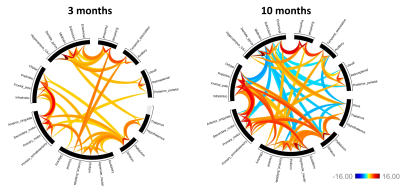 |
0185. Modeling
structural and functional connectomics with cognitive deficits
and spatial transcriptomics in a mouse model of tauopathy

E. Hipskind, L. Fadel, S. Pedersen, C. Ortiz, J. Romero,
S. Fox, T. Manirambona, M. A. H. Samee, R. Pautler
Baylor College of Medicine, Houston, United States
Impact: We use machine learning to understand the
relationships between structural and functional connectivity
with cognitive deficits in a mouse model of tauopathy, as
well as identify underlying spatial transcriptomic changes
to enhance our understanding of the progression of tau
pathology.
|
| 13:57 |
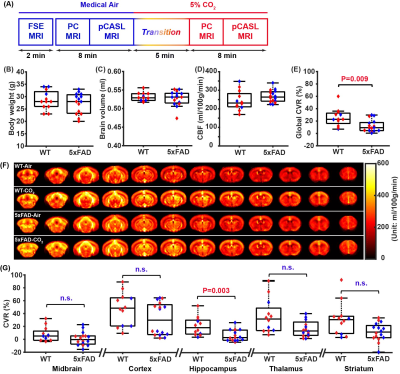 |
0186. Impaired
cerebrovascular reactivity is associated with vascular smooth
muscle cell loss in a mouse model of Alzheimer’s disease
X. Yang, M. Yao, Y. Li, H. Lu, W. Duan, Z. Wei
The Johns Hopkins University School of Medicine, Baltimore, United States
Impact: Impaired cerebral vascular reactivity (CVR) is
associated with the loss of vascular smooth muscle cells in
the hippocampus of 5xFAD model at 9 months of age.
|
| 14:09 |
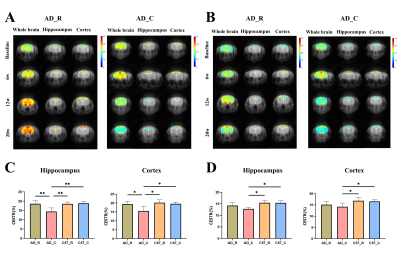 |
0187. CEST
Imaging Combined with 1H-MRS Reveal the Neuroprotective Effects
of Riluzole by Improving Neurotransmitter Imbalances in 3xTg AD
Mice

Y. Shen, S. Liu, X. Zhang, W. Xuan, C. Zhuang, Y. Chen,
B. Chen, X. Zheng, Y. Lin
Second Affiliated Hospital of Shantou University Medical College, Shantou, China
Impact: This study highlights the potential of combining
CEST imaging and 1H-MRS as a non-invasive approach to
evaluate riluzole’s effects on Glu/GABA metabolism and
cognitive function in AD mice, providing a promising
neuroimaging tool for assessing AD therapies.
|
| 14:21 |
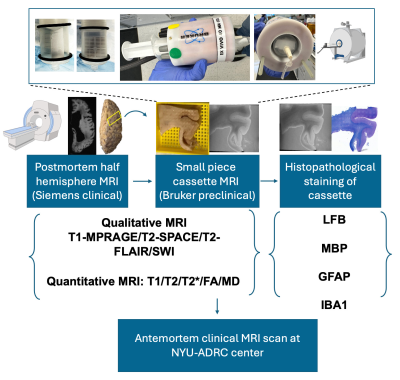 |
0188. Multimodal
Postmortem MRI and Histopathological Analysis Reveal Complex
Signal Origins of White Matter Hyperintensity in Alzheimer's
Disease

C. Li, D. Leitner, H. Pang, M. Bruno, A. Faustin, T.
Wisniewski, H. Scholtzova, Y. Wadghiri, J. Zhang, Y. Ge
New York University Grossman School of Medicine, New York, United States
Impact: Direct comparisons between multimodal MRI and
histopathological findings revealed the complex pathological
underpinnings of WMHs in Alzheimer's Disease. These insights
advance our understanding of MRI signal changes with WMHs
development and progression in vivo.
|
| 14:33 |
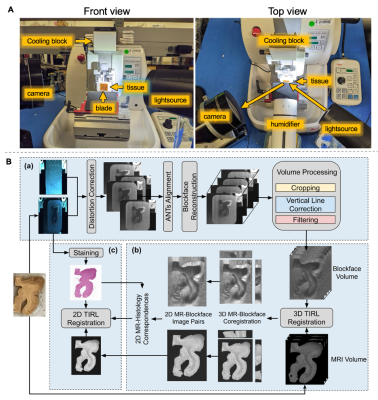 |
0189. Volumetric
Histology via High-Fidelity Coregistration with MRI

Y. Wang, W. Ho, I. Huszar, H. Moein Taghavi, J. Nirschl,
L. Tao, N. Nguyen, S. Leventis, D. Camarillo, P.
Schlömer, M. Axer, W. Shao, M. Rusu, P. DiGiacomo, I.
Cobos, M. Georgiadis, M. Zeineh
Stanford University, Palo Alto, United States
Impact: This study introduces an advanced correlative
MRI-histology pipeline to reconstruct volumetric histology,
promising to enhance our understanding of neurodegenerative
diseases and contribute to the evolution of MRI-based
disease biomarkers.
|
| 14:45 |
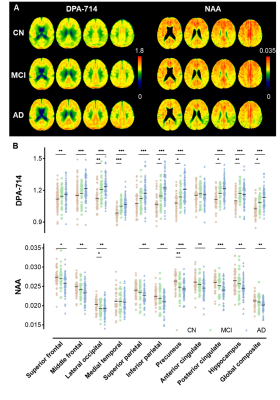 |
0190. Influence
of microglial activation on neuronal metabolism in Alzheimer’s
disease: A hybrid 3D-MRSI/PET study
Y. Zhang, J. Hu, X-H Qian, M. Zhang, Y. Zhao, Y. Li, W. Jin,
C. Xu, H. Zhuang, Z. Meng, W. Li, S. Chen, X-F Jiang, Z-P
Liang, B. Li, H. Tang, Y. Li
Shanghai Jiao Tong University, Shanghai, China
Impact: Using a hybrid 3D-MRSI/PET approach, we
identified a biphasic effect of microglial activation on
neuronal metabolism across healthy, prodromal AD and AD
dementia stages. This approach provides a valuable tool for
evaluating neuroinflammation and neuronal integrity
throughout AD progression.
|
| 14:57 |
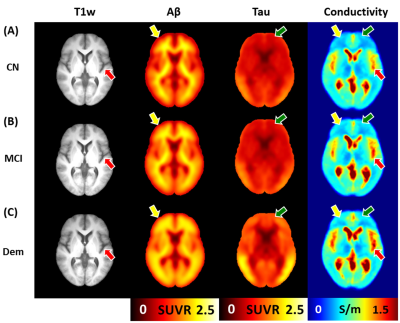 |
0191. Brain
tissue electrical conductivity as a promising biomarker for
dementia assessment using MRI

J. Chu, Z. Li, J. Li, Y. Zhang, H. He, B. Li, H. Wei
Shanghai Jiao Tong University, Shanghai, China
Impact: Our findings reveal a significant relationship
between increased brain tissue conductivity and protein
aggregation in dementia, suggesting that conductivity may be
a non-invasive biomarker for monitoring AD and
neurodegeneration mechanisms.
|
| 15:09 |
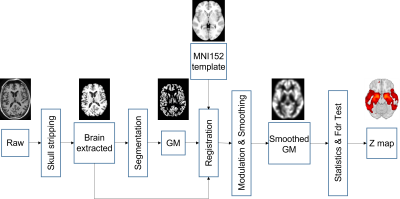 |
0192. DeepVBM:
Implementing and Integrating Deep-Learning Models for
Time-Efficient and Accurate Voxel-Based Morphology in an
Open-Source Toolbox

P-M Sun, T-Y Huang, T-C Chuang, Y-R Lin, H-W Chung
Department of Electrical Engineering, National Taiwan University of Science and Technology, Taipei, Taiwan
Impact: Applied DeepVBM to Alzheimer’s research, it
demonstrates accuracy comparable to FSL with reduced
computing time. The open-source toolbox is compatible with
major operating systems, accelerating neuroimaging studies
and enabling more efficient, large-scale analyses.
|
| 15:21 |
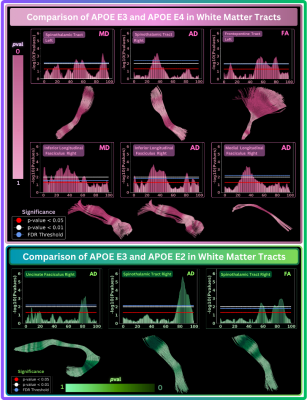 |
0193. Mapping
the Influence of Amyloid, Tau, and APOE Variants on White Matter
Tracts in Alzheimer’s Disease

B. Chandio, J. Villalon-Reina, T. Nir, S. Thomopoulos,
Y. Feng, S. Benavidez, N. ahanshad, J. Harezlak, E.
Garyfallidis, P. Thompson
University of Southern California, Marina del Rey, United States
Impact: Our findings highlight the role of tau, amyloid,
and APOE variants in disrupting brain connectivity, shedding
light on Alzheimer's disease pathology and localized white
matter tract changes.
|
| 15:33 |
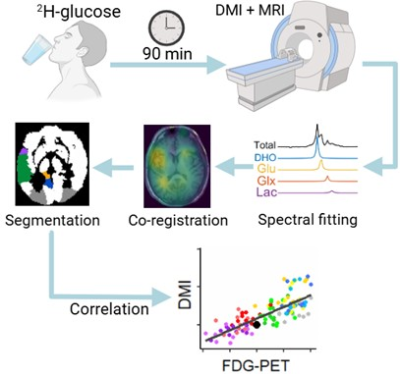 |
0194. Deuterium
Metabolic Imagining as an alternative to FDG-PET for the
diagnosis of Alzheimer’s Disease
K. Trosborg, N. Christensen, N. Boegh, M. Aastrup, M.
Kristensen, E. Hansen, H. Gottrup, J. Mortensen, P.
Borghammer, J. Blicher, R. Schulte, J. Miller, M. Vaeggemose,
C. Laustsen
Aarhus University, Aarhus, Denmark
Impact: This study suggests that DMI can aid the
diagnosis of Alzheimer’s disease, but the low spatial
resolution of DMI should be addressed in future studies. As
total DMI signal correlates with FDG-PET, reducing spectral
resolution could be the way forward.
|
The International Society for Magnetic Resonance in Medicine is accredited by the Accreditation Council for Continuing Medical Education to provide continuing medical education for physicians.